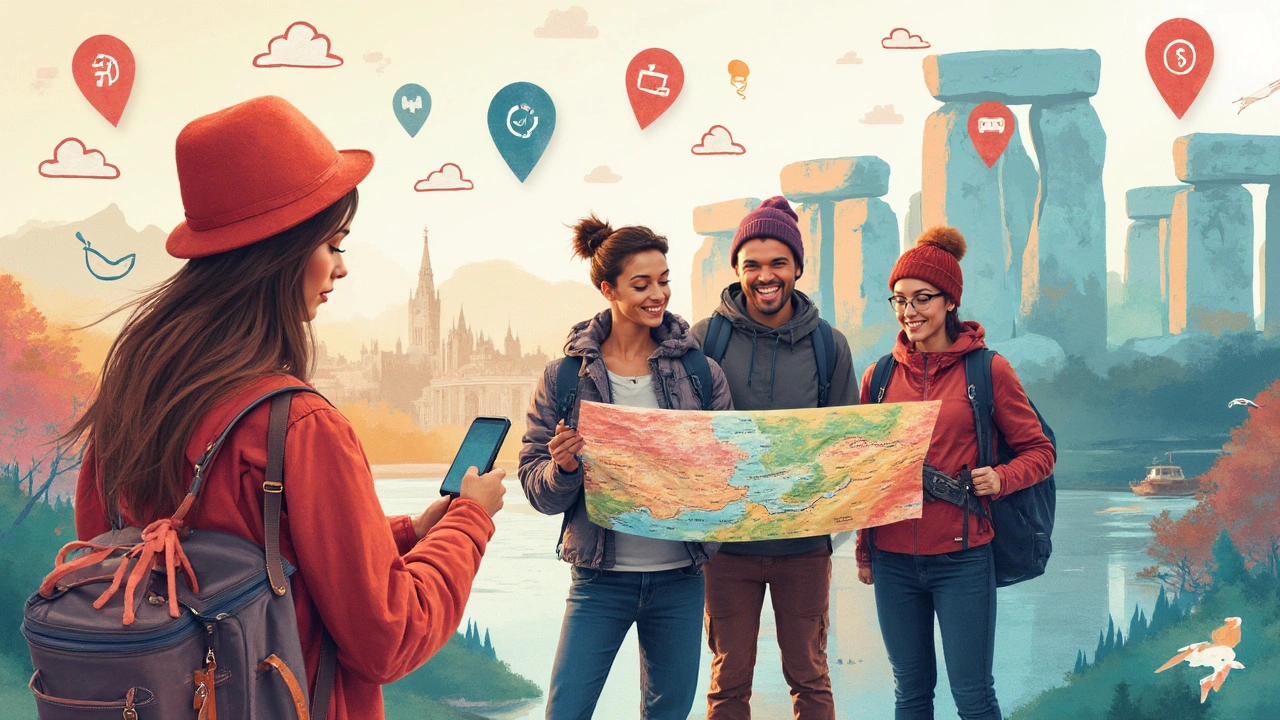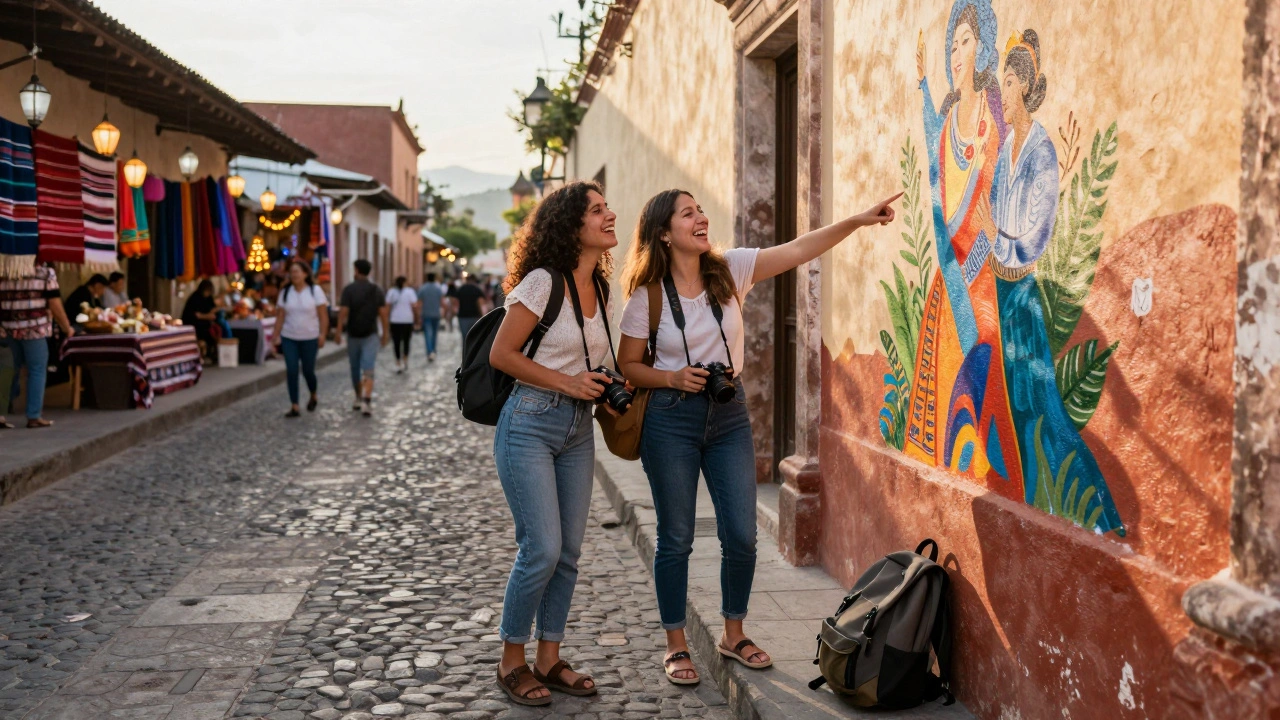Travel Companion Guide: From Solo Trips to Group Adventures

Picking the right travel companion can decide if your trip is a breeze or a headache. Everybody handles travel differently—you might crave freedom and quiet, while your friend thrives on group energy and late-night plans. Before you settle on solo travel, a group tour, or grabbing a friend, get clear about what you really want out of this trip.
If you always end up running late or hate strict schedules, solo travel gives you the control to call all the shots. No negotiations, no missed buses because someone wanted “just ten more minutes.” But if you need the motivation to try new things or just want someone to split the costs on rideshares and hotel rooms, a group setup makes more sense.
Before booking anything, ask yourself a few honest questions: Are you happier wandering alone or swapping stories at dinner with a buddy? Would you rather tackle trip planning solo, or is the thought of a travel spreadsheet your worst nightmare? Getting to the heart of your travel style now saves a lot of stress down the road.
- Solo Travel vs Group Adventures: What Fits Your Style?
- Traits to Look For in a Travel Companion
- Finding and Choosing the Right Travel Buddy
- Planning and Setting Expectations
- Staying Safe and Connected On the Road
Solo Travel vs Group Adventures: What Fits Your Style?
Deciding between hitting the road alone or teaming up with others comes down to what you want from your trip. Each style has its perks and its headaches, so let’s break it down in plain English.
When you travel solo, travel companion becomes a non-issue; you call the shots every day. Your time is yours. Changing plans is easy, and you don’t have to compromise on where to eat or what to see. If you’re into spontaneous changes, solo travel is pure freedom. According to a 2024 Hostelworld survey, 25% more travelers are now booking solo trips than five years ago, and women are leading the charge.
But going solo does mean you handle everything yourself: bookings, safety, and making friends on the fly. There’s no one to split costs with. Sometimes, eating alone or missing home hits hard.
Group adventures are a different animal. They’re social—think shared meals, inside jokes, and safety in numbers. Costs—like hotel rooms and taxis—get divided, which stretches your budget. Planning gets easier, too. In a 2023 Intrepid Travel report, 60% of travelers said they chose group tours for ease and safety, especially in places they found unfamiliar.
Of course, there’s less privacy and you’ll have to play by group rules. If someone wants to hike all day and you want to nap, you’ll need to compromise. Decision-making as a group can sometimes mean long talks about dinner instead of just picking a spot.
Here’s a quick side-by-side to help size up what’s right for you:
| Solo Travel | Group Travel |
|---|---|
| Total freedom on timing and plans All decisions on you Can get lonely No one to split costs | Shared costs Built-in social net Less flexibility Group decision-making |
Thinking about your comfort zone, budget, and how much social time you want is your best bet for a trip that actually matches what you need. If you’re not sure, start small: try a weekend solo getaway or join a day group tour to get a feel for both sides.
Traits to Look For in a Travel Companion
Picking a travel companion goes way beyond just liking someone in daily life. When you’re on the road, you notice things you might totally miss at home—stuff like patience, flexibility, money habits, and even how people deal with stress. Forget the idea that fun friends automatically make top-tier travel partners—it’s about way more than having things in common or a good sense of humor.
- Flexibility: Plans can change fast, especially with flights, weather, or even a missed train. You want someone who can roll with the punches and isn’t going to panic if there’s a hiccup.
- Similar Budget Style: Money is the #1 thing people argue about on trips. Check if you both thrift or splurge the same way. It’s awkward when one person wants hostels and street food, and the other insists on five-star hotels.
- Communication Skills: Open talk goes a long way. Travel partners need to hash out plans, speak up if they’re tired, or sort out conflicts before they boil over.
- Shared Interests, But Not Clones: Liking different things is fine, but if you are total opposites (one wants hikes, the other only museums), it’s tough. A little give-and-take works best.
- Problem Solving: Someone who can figure out directions, use Google Translate, or just stay calm when things get weird is gold.
- Respect for Personal Space: No one wants a travel shadow the whole trip. Look for someone who gets that solo time is healthy—even in a duo or group.
Personality clashes are a big reason trips go south. According to a 2024 survey by Hostelworld, 38% of travelers said that disagreements about daily routines—like waking up early versus sleeping in—caused tension with travel partners. This isn’t just a minor thing; it can shape the whole vibe of your trip.
| Trait | Percent of Travelers Who Prioritized |
|---|---|
| Flexibility | 68% |
| Similar Budget | 60% |
| Good Communication | 54% |
| Respect for Space | 47% |
| Shared Interests | 43% |
You don’t have to tick every single box, but focus on the “must-haves.” Before setting off, ask about travel routines, non-negotiables, and backup plans if things go wrong. Just one honest conversation in advance can save your vacation (and maybe your friendship).

Finding and Choosing the Right Travel Buddy
Picking a travel companion isn’t random luck—it’s more like choosing a roommate for days or weeks on the road. You want someone who shares your basic style and won’t turn every meal choice or museum visit into an argument.
Start with the basics: Are your budgets in the same ballpark? Nothing ruins a trip like arguing between street food stalls and five-star restaurants. A recent 2024 Statista survey found that 43% of group travelers argued over daily spending, so bring up money early.
Next, do a quick habits check. Morning person or night owl? Love walking everywhere or prefer taxis? These things matter more than you think once you're in a new place. You can each fill out a quick travel habits checklist like this before committing:
- What’s your daily budget (meals, hotels, transport)?
- Are you an early riser or late sleeper?
- What’s one thing you “have to” do on this trip?
- Open to splitting up for parts of the day?
- How much do you pack/planned vs. winging it?
Don’t just rely on close friends—sometimes strangers or acquaintances make better travel partners. Tons of people find their travel buddies through platforms like Meetup or Facebook travel groups. Apps like GAFFL and Travello connect you with others headed to the same spots. Last year, GAFFL reported a 34% jump in users looking for group trips and event-based travel companions after COVID travel restrictions eased.
| Popular Travel Buddy Platforms (2024) | Type | User Base |
|---|---|---|
| GAFFL | Group & Solo Trips | 150k+ |
| Travello | Solo Travelers & Events | 500k+ |
| Backpackr | Backpackers/Long-Term | 220k+ |
Before you join forces, have one real conversation about how you both want the trip to go. Talk about worst-case scenarios. Would you bail out if your buddy lost their passport? Do you want to stick together the whole time or go solo some days? The more honest you are now, the less likely you’ll end up regretting the partnership later.
Planning and Setting Expectations
Nothing ruins a trip faster than mismatched expectations. Before you and your travel companion book flights or even make a packing list, have an honest talk about what you both want. A 2023 TripAdvisor survey found that 41% of travelers who argued during group trips blamed misaligned plans or budgets. Avoid that mess by getting on the same page from the start.
Here’s what you should discuss before you even confirm dates:
- Budget: Define your daily spending limit. Are you looking for hotels or hostels? Will you be eating street food or booking fancy dinners?
- Travel Pace: Do you like a packed schedule or do you prefer long coffee breaks and wandering aimlessly?
- Must-Sees: Is there anything you absolutely have to visit or do? Dealbreakers and wish lists save awkward moments later.
- Chores and Responsibilities: Who’s booking tickets or looking up restaurants? Divvy up tasks to avoid one person doing all the work.
- Alone Time: Some people need breaks from the group. It’s totally okay to set times for solo exploring, so nobody gets frustrated.
Set up a shared document or app—Google Docs and TripIt are popular for groups—so everyone can add ideas and check plans in real time. If you’re with a new travel buddy, a short video call to talk through the trip can clear up a lot before you commit.
Finally, be flexible. Travel plans rarely go perfect. A bit of patience and honest feedback helps keep things smooth if plans change or someone’s having a bad day. If you keep things open and upfront, it’s easy to adjust and make sure travel companion drama doesn’t ruin your memories.

Staying Safe and Connected On the Road
Traveling with a buddy or group means you look out for each other, but it doesn’t replace basic commonsense safety. Before heading out, swap emergency contacts and save local emergency numbers in everyone’s phone. Pick a meeting spot in case you get separated. This is crucial in crowded places like big markets or festivals.
Getting lost is less likely now thanks to phone maps, but roaming fees or spotty Wi-Fi can leave you stuck. Download offline maps with Google Maps or apps like Maps.me before you go. For staying in touch, many travelers use WhatsApp since it works globally and can verify your location quickly if you share your live spot with your group.
Money safety is just as important. Don’t keep all your cash and cards in one spot. Spread them out in your bags and consider carrying a backup debit card somewhere separate. If your group likes to split bills, use apps like Splitwise or Venmo to avoid arguments and make things easy.
- Send your itinerary to someone trustworthy back home before you leave.
- Always keep a copy of your passport—printed or digital.
- Set up a group chat with your travel companion(s) for quick check-ins, sharing photos, or flagging problems.
If you’re meeting a new travel buddy, arrange first meetings in busy public places. Read online reviews of anyone you find through travel forums or apps. Trust your gut about situations or people—no trip is worth putting yourself at risk just to be polite.
Basically, a little prep goes a long way. It keeps you connected, calm, and free to enjoy the adventure.


